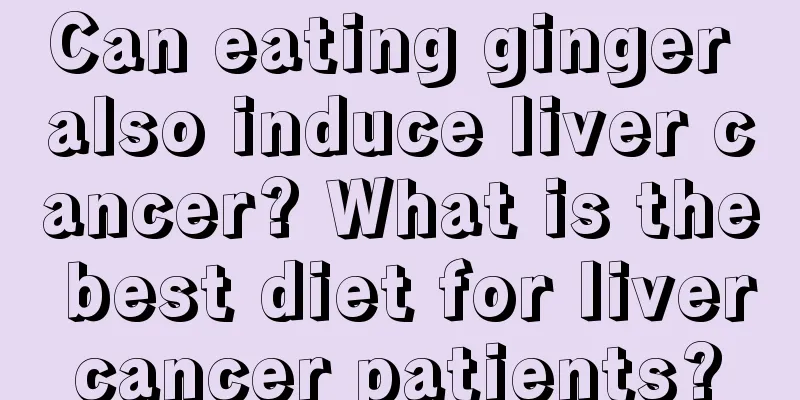Can eating ginger also induce liver cancer? What is the best diet for liver cancer patients?

|
As the saying goes, "Eat radish in winter and ginger in summer, and you won't need a doctor to prescribe medicine" and "Eat ginger in all seasons, and all diseases will be gone", which shows that eating ginger is good for the human body. However, a study found that excessive consumption of ginger increases the risk of liver cancer. Research by the U.S. Food and Drug Administration (FDA) shows that safrole can cause liver cancer. Adding 0.04% to 1% safrole to the feed of mice for 150 days to 2 years can induce liver cancer in mice. The process by which safrole is metabolized into active carcinogens is now relatively clear: safrole is first metabolized into phenylethanol in the mouse body, and then activated and converted into acetate or sulfate, becoming the final carcinogen. If safrole is combined with an oxidant, it will produce epoxy safrole with stronger carcinogenic activity. Ginger contains safrole. Excessive consumption of ginger can easily increase the risk of liver cancer. Although ginger is good, avoid excessive consumption. In addition, rotten ginger produces toxins that can also cause cancer. Some people believe that "rotten ginger does not taste rotten", but this idea has no scientific basis and is also very dangerous, because rotten ginger produces toxins, which can cause liver cancer and esophageal cancer in severe cases. Liver cancer is the second most common malignant tumor in my country. According to statistics, about 260,000 people die of liver cancer every year in the world, and nearly 100,000 in my country. Liver cancer has become one of the diseases that seriously endanger human health and life, and should be taken seriously. Patients with liver cancer will experience symptoms such as pain in the liver area, digestive tract symptoms, fever, bleeding tendency, and joint pain throughout the body. If you find any discomfort in your body, it is best to go to the hospital for examination in time to avoid missed diagnosis. There is an old Chinese saying that "know when to stop" and "too much is as bad as too little". Therefore, everything should be done in moderation, just like ginger. Eating less ginger can strengthen the body, but eating more can easily lead to liver cancer. In addition to eating less ginger, what else can you do in your daily life to prevent liver cancer? What should you pay attention to in the dietary care of liver cancer? Things to note when caring for liver cancer 1. Liver cancer diet, pay attention to a balanced diet. Most patients with advanced liver cancer are in a state of systemic failure and have difficulty eating. They should focus on strengthening the body. In addition to adding nutrients, American ginseng or white ginseng is often used to soak in water to enhance the functions of various organs. Fat and protein: A high-fat diet will affect and aggravate the condition, while a low-fat diet can alleviate symptoms such as nausea, vomiting, and abdominal distension in patients with liver cancer. Liver cancer patients have a poor appetite and eat less. If they do not have a balanced diet of sufficient quantity, they must increase the calories of the diet and eat fats and sweets that are easy to digest and absorb to avoid albumin reduction. However, in the late stage of liver cancer, when liver function is poor, it is necessary to control protein intake to avoid excessive protein intake that may induce hepatic encephalopathy. 2. Liver cancer patients should pay attention to vitamin supplementation in their diet. Vitamin A, C, E, K, etc. have certain auxiliary anti-tumor effects. Vitamin C is mainly found in fresh vegetables and fruits. Carotene can be converted into vitamin A after entering the human body, so liver cancer patients should eat more animal liver, carrots, cauliflower, day lily, cabbage, figs, jujube, etc. 3. Liver cancer patients should eat easily digestible food and avoid greasy food. Liver cancer patients often have symptoms of indigestion such as loss of appetite, nausea, and abdominal distension, so they should eat easily digestible food to help digestion and relieve pain. Do not eat too cold, too hot, or too full. Liver cancer patients often have nausea, vomiting, and loss of appetite. They should eat light food that can stimulate the appetite and reduce nausea, such as almond juice, lotus root powder, corn paste, kumquat cake, mountain slag cake and other easily digestible foods, and avoid eating heavy oil and greasy food. 4. The supplement of inorganic salts is also a dietary consideration for liver cancer. That is, minerals. Nutritionists divide inorganic salts into two categories: macroelements, such as calcium, sodium, potassium, phosphorus, iron, etc.; trace elements, such as selenium, zinc, iodine, copper, manganese, germanium, etc. Scientists have found that minerals such as selenium, magnesium, copper, magnesium, and iron have anti-cancer effects. Liver cancer patients should eat more foods rich in trace elements with anti-cancer effects. What are the principles of dietary care for liver cancer? 1. The food in the diet of patients with advanced liver cancer should be easy to digest, absorb and excrete, which is conducive to alleviating symptoms and recovering from the disease. In terms of diet, special attention should be paid to providing vegetables and fruits, such as tomatoes, rapeseed, lettuce, cauliflower, kiwi, oranges, strawberries, etc., meat, soy products, as well as milk and dairy products. If there are symptoms of portal hypertension, choose soft, non-irritating liquid or semi-liquid drinks as much as possible. 2. Choose foods that are easy to digest. Therefore, in the diet arrangement of patients with advanced liver cancer, special attention should be paid to providing easily digestible foods. The food must include a certain amount of staple foods, such as wheat flour, corn, sweet potatoes, millet, etc., vegetables, fruits, such as tomatoes, rapeseed, lettuce, cauliflower, kiwi, oranges, strawberries, etc., meat, soy products, as well as milk and dairy products. 3. Liver cancer patients have difficulty digesting and absorbing fat. Therefore, especially in the late stage of liver cancer, it is not advisable to eat too much fat in the diet. Foods such as fatty meat, fried food, dried fruits, sausages, etc. should be avoided. A low-fat diet can not only alleviate the digestive tract symptoms of liver cancer patients, such as nausea, vomiting, abdominal distension, etc., but also less fat in the diet can also reduce the degree of pain in the liver area to a certain extent. |
Recommend
How to detect colorectal cancer
With the improvement of living standards, the qua...
How to effectively treat colon cancer
How to effectively treat colon cancer? Everyone i...
Pulmonary blood vessels ruptured and vomited blood
There are a large number of blood vessels distrib...
Can I change back to being ugly after pregnancy?
For most women, pregnancy is filled with both ant...
What to do if toenail is injured and water is flowing
In daily life, injuries are quite common. Everyon...
Good living habits can effectively prevent cervical cancer
Gynecological diseases have seriously affected wo...
How to effectively prevent the occurrence of liver cancer? Pay attention to 3 details in your diet to prevent liver cancer
To prevent liver cancer, you must first control y...
How much does it cost to cure laryngeal cancer
Laryngeal cancer is a very serious malignant tumo...
What are the prevention methods for malignant melanoma
What are the prevention methods for malignant mel...
Drugs for treating pancreatic cancer abroad
The best drug for pancreatic cancer treatment; th...
What to do if your hair smells bad
Having clean hair will make a person feel refresh...
Fetal thyroid development time
When it comes to thyroid disease, people are actu...
What are the common complications of prostate cancer? A brief analysis of the three complications of prostate cancer
In recent years, the incidence of prostate cancer...
What are the factors for lung cancer staging? There are three points
There are many reasons for lung cancer. The appea...
What are the effects of loquat pear rock sugar water?
Loquat and pear rock sugar water is a very common...









